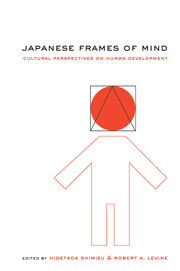Book contents
- Frontmatter
- Contents
- Notes on the Contributors
- Preface: Japan as Front Line in the Cultural Psychology Wars
- Introduction: Japanese Cultural Psychology and Empathic Understanding: Implications for Academic and Cultural Psychology
- PART ONE MORAL SCRIPTS AND REASONING
- PART TWO MOTHER AND CHILD AT HOME
- 3 The Maternal Role in Japan: Cultural Values and Socioeconomic Conditions
- 4 Japanese Mother-Child Relationships: Skill Acquisition before the Preschool Years
- PART THREE GROUP LIFE: THE YOUNG CHILD IN PRESCHOOL AND SCHOOL
- PART FOUR ADOLESCENT EXPERIENCE
- PART FIVE REFLECTIONS
- Index
4 - Japanese Mother-Child Relationships: Skill Acquisition before the Preschool Years
Published online by Cambridge University Press: 23 July 2009
- Frontmatter
- Contents
- Notes on the Contributors
- Preface: Japan as Front Line in the Cultural Psychology Wars
- Introduction: Japanese Cultural Psychology and Empathic Understanding: Implications for Academic and Cultural Psychology
- PART ONE MORAL SCRIPTS AND REASONING
- PART TWO MOTHER AND CHILD AT HOME
- 3 The Maternal Role in Japan: Cultural Values and Socioeconomic Conditions
- 4 Japanese Mother-Child Relationships: Skill Acquisition before the Preschool Years
- PART THREE GROUP LIFE: THE YOUNG CHILD IN PRESCHOOL AND SCHOOL
- PART FOUR ADOLESCENT EXPERIENCE
- PART FIVE REFLECTIONS
- Index
Summary
Ethnographic studies on Japanese family life have suggested that the acquisition of basic social and communicative skills during early childhood take place in the context of a close emotional bond between mother and child, with the mother avoiding confrontation in order to encourage attunement to her wishes. The present study was designed to test this hypothesis and describe how skills can be taught in early childhood without conflict between mother and child. This study specifies the maternal strategies and speech patterns involved and presents how the mothers are sensitive to their children's reaction to their controlling effort and how their childrearing ideals are reflected in their interaction patterns.
Videotaped observations were made of ten urban middle-class Japanese mothers with their twenty-four- to thirty-eight-month-old children during snack time at home. Microanalysis of interactive sequences and maternal explanations showed: (a) Mothers prefer indirect verbal instructions to direct ones, often using the latter only when the former have not worked, and (b) Mothers believe that they should not oppose the child's will to insure spontaneous compliance with maternal instructions that will be experienced by the child as voluntary rather than coerced.
While these findings support the hypothesis generated by ethnographic studies, there are findings to which ethnographic reports have paid little attention, due to their emphasis on culture-specific aspects of childrearing patterns: (a) Japanese mothers do use direct verbal instructions, though they do so in a sensitive way, without making them sound imposing, and (b) Some indirect maternal strategies marked as culture-specific are not observed ubiquitously in actual mother-child interactions.
- Type
- Chapter
- Information
- Japanese Frames of MindCultural Perspectives on Human Development, pp. 111 - 140Publisher: Cambridge University PressPrint publication year: 2002



